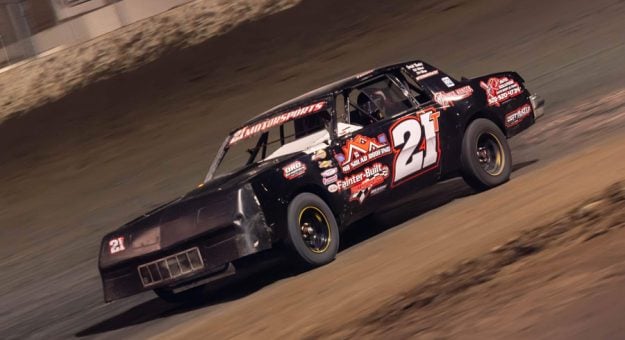LINCOLN, Calif. — A significant portion of a short track’s income on a race night is from pit passes. Lots of race cars in the pit area helps offset a shortage of income in other areas, such as the weather being unfriendly and a smaller than expected front gate.
There are tracks that probably overdo the number of support divisions, but if the number of classes is four or five, a properly run show will not be unacceptably lengthy.
Northern California dirt tracks are mostly sprint car tracks. Placerville Speedway, Marysville Raceway Park, Petaluma Speedway and Ocean Speedway have winged 360 sprints as the featured division and there is no doubt they are responsible for drawing more fans than any other class.
But all the tracks include some support divisions, the number of which are sometimes determined by how big the sprint car portion of the evening will be. Placerville usually has three support divisions except if it is a Sprint Car Challenge Tour night or the NARC winged 410s are scheduled. Then, it is wisely one support division only.
One excellent support division is hobby stocks, whether IMCA-sanctioned or not. These drivers race for a much smaller purse than top divisions, pay the same price for a pit pass and tend to enjoy far less sponsor support. Because of the size of the payout, a hobby stock division is almost a guaranteed money maker for the track.
But the hobby stock drivers are paid relatively little and still support their division and tracks that book them.
One example of a driver who is in this category is Yuma, Ariz., IMCA hobby stock driver Scott Tenney. An off-and-on racing program was the result of a career in the Navy and the accompanying relocation that often is part of the deal.
Tenney was 16 when he first raced a Ford Pinto mini stock, but grew up around racing.
“My father raced in the ’50s, ’60s and ’70s,” Tenney recalled, “and ran a race track in Colorado when I was four years old. I remember riding with him either hauling stuff or watering the track. He ran Delta Motor Speedway in Delta, Colo., which has not existed for about 35 years. He ran the whole show for about a season and a half.”
Joining the Navy meant relocating several times. Boot camp was in Chicago, then he was in Florida and eventually San Diego for a large part of his career. After 23 years, Tenney retired from the Navy but now does the same work at the Marine Corps. base in Yuma as a government contractor.
With a race schedule based on where he was stationed, Tenney raced Barona Speedway with a street stock and then moved to Fallon, Nev., and raced at the local track, Rattlesnake Raceway.
Eventually he sold the street stock, bought it back a year and a half later and turned it into an IMCA hobby stock.
His current car was purchased as a bare chassis in October of 2021, was built in his garage and raced for the first time in July of 2022.
“It came with no firewall or floorboard and I made the seat, firewall and floorboard, hung the body, put all the suspension under it, drive train, everything but painting the car and lettering,” Tenney explained. “It was a bare, rusty chassis I got out of a buddy’s backyard, sandblasted it, got it painted and went from there. The engine is now a borrowed crate that I am purchasing from my buddy.”
Tenney has accumulated 20 wins in four states at five different tracks. The idea of moving up to sport mods has been considered, but the increased financial burden makes it unlikely.
“If I had more funding and time I would move up but the group we race with is just a blast,” Tenney said. “We race each other hard then after the race it’s high fiving each other and let’s do that again.”
His mechanical skills play a large part in being able to race an IMCA hobby stock.
The accumulation of knowledge goes back years when he was involved with pavement racing.
“I was learning as I went, I crewed on asphalt cars for about five years, so I learned a lot of setup and fabrication,” Tenney said. “The rest of it I learned as I grew up. I look at basic maintenance as similar to what it would cost me to go out to dinner and a movie. But I get paid at the end of the night.”
“I’ve seen tracks pay as low as $100 to win, our average here is about $250, and the Winter Nationals paid $100 to start,” Tenney said. “Out of pocket, on the low end, if I don’t tear a lot of stuff up, at least $5,000 to $10,000 to race a full season, which is about 30 nights.
“Racing a hobby stock is kind of the middle of the road, it’s not the bottom, it’s not the top, but it’s great competition and to me it’s a big part of my life,” Tenney continued. “Luckily my wife puts up with it and we’re able to race and have fun with it and not be like we have to buy a new car every year. Take care of your equipment and it’ll take care of you. We have fun, make friends along the way and create memories which is the biggest thing.”
Scott Tenney is enjoying what he is doing at this level of racing and at the same time, along with all the support division racers, is playing a big part in keeping short-track racing alive.
